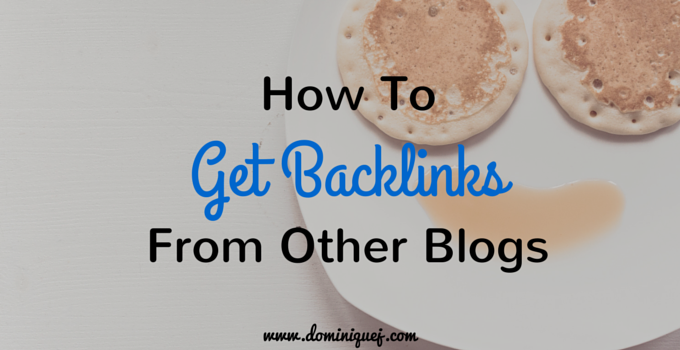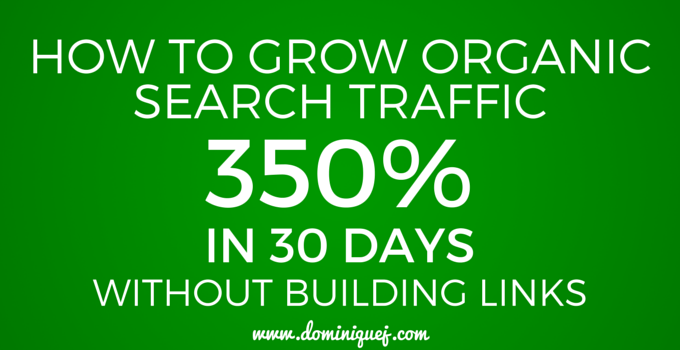SEO is one of the most popular ways to get traffic to your blog. Having your site show up in Google when people search for different phrases related to your site gives you a consistent stream of traffic. Even though you shouldn’t be relying entirely on Google and SEO for traffic, it should definitely be a part of your strategy to build your blog.
I’ve written about how I was able to increase my traffic from SEO by 350% in 30 days without building links. I emphasized the “without building links” part because in order to get those results, I didn’t have any type of plan to get links to my blog. I relied on things like internal linking and on-page SEO.
But getting links to your site is one of the most important aspects of SEO and getting your site to rank for different search phrases. On top of that, one of the most common questions bloggers have is “how do I get backlinks?” I’ll give you the answer, and go over some actionable steps you can take to start getting other bloggers to link to your content.
What Are Backlinks?
One of the things I like about doing my blog is that my readers are all at different levels. I have a readers who have a lot of experience with blogging, others with a little bit of knowledge, and then there’s the people that are just getting started. I try to appeal to all of you, and don’t want anyone to be left in the dark. So if you know about what backlinks are already, feel free to skip ahead. But for everyone else, make sure you read this section so that you understand the rest.
Backlinks are just a link pointing from one site to another. For instance, this is a backlink to Google. In general, you use backlinks to link to supporting content, examples, or just to shout out another site. But when it comes to SEO, backlinks are a way of telling Google and other search engines that the site being linked to is relevant for a particular topic. Think of backlinks as votes from one site to another. The more votes a site has from other sites, the more popular Google will determine it to be, and the more likely it is to show the site in its search results.
The backlink is made of two parts. One is the anchor text, and the other is the URL. The anchor text is the actual words that are linked. In my example with Google above, the anchor text is “this is a backlink”. The URL is the actual page being linked to (google.com).
Now here’s where things get interesting. Search engines use the anchor text to help determine what the page being linked to is about. The anchor text isn’t the only thing search engines look at, but it’s one of them. They also look at the topic of the page the backlink is coming from, and the content on the site being linked to.
The reason search engines don’t rely as heavily on just anchor text is because it can be easily manipulated. And that’s one of the reasons for Google’s Penguin algorithm update. It was designed to penalize/devalue sites that have a ton of backlinks with over-optimized exact match anchor text pointing to them.
The reason Google gets a red flag when they see over-optimized anchor text is because ideally you shouldn’t have any control over the sites that link to you. That means you shouldn’t be able to control the actual anchor text used for links pointing to your site. When you have 100 backlinks pointing to your site all using the exact same anchor text, it seems a bit fishy. Because most people linking to a specific page aren’t going to use the exact same anchor text.
Let’s look at an example. Say I wrote an awesome blog post about tree cutting. Another blogger is writing an article about gardening, and mentions tree cutting. They find my post and want to link to it. So their post might say something along the lines of
here’s a great post with more info on tree cutting
Notice that the anchor text is “here’s a great post”. Then another blogger is writing an article about how they cut down a tree in front of their home. In that article, they might say
I followed this guide on tree cutting to learn how to do it
The anchor text there is “guide on tree cutting”. Notice that both bloggers link to the same exact page, but use different anchor text. That’s completely natural and the way it should be done.
On the flipside, if I was to somehow manipulate the backlinks and have them all have the exact same anchor text of “tree cutting”, that would look suspicious and could open me up to potential trouble.
The reality is that people manipulate backlinks all the time without getting penalized by Google. There are plenty of different “blackhat” SEO tools that automate linkbuilding. Matthew Woodward talks about some of them on his site. I’m not going to touch on any of those techniques in this post though. Mainly because I think it’s important for you to learn how to earn links the legit way. Way too many people that use automated tools don’t understand the legit ways of getting backlinks, so they end up completely messing up their sites.
Now that you have a better understanding of what backlinks are, how do you get them?
Make Content Worth Linking To
The very first step for getting bloggers to link to your site is making awesome content. Remember, we’re taking the approach that backlinks are earned. It’s hard to earn backlinks if your content sucks. People like to link to great blog posts, period.
On my blog, I only link to content that I think is really helpful. If I started linking to a bunch of low quality sites, it would probably make you question whether or not I even know what I’m talking about and hurt my credibility. That’s the same mindset other bloggers have when they’re looking for sites to link to.
I’ve noticed that certain types of blog posts tend to be way more “linkworthy” than others. People like to link to these types of blog posts the most:
- Top X lists – Top 7 Sites For WordPress Themes For Your Blog
- Ultimate guides – Ultimate Guide To Optimizing Images For Your Blog
- How-to posts – How To Create An Awesome SlideShare Presentation
Here’s some other types of content that bloggers love to share. Generally the more in-depth a post is, the more likely people are to link to it. I always say that content doesn’t have to be long, but I’m not living in a fantasy world. When bloggers see a longer in depth post like an ultimate guide, they’re more likely to share it because they assume it has a lot of value.
Aside from the type of post, the quality of the content has to be top notch too. If your blog is filled with a bunch of posts that are barely even readable because of all the grammatical problems, good luck getting links from other bloggers. Put some effort into creating awesome content, and you’ll have a much better chance of earning backlinks.
Outreach
A lot of the sites I link to on my site are bloggers that I’ve connected with on social media or people that have reached out to me. For instance, I occasionally link to posts from Priyanka. Priyanka originally contacted me through email, and since then she’s also done a guest post on my site. That’s the power of outreach marketing.
Getting to know other bloggers in your niche/industry is one of the best ways to start earning links. Here’s a great post that goes over some tips on how to do outreach strategically. Here’s a hint though, use social media.
Whether you’re on Twitter, Facebook, LinkedIn or even Google+, you can find other bloggers in the same niche as you to connect with. You don’t want to just start asking them to link to your site right away. In fact, I wouldn’t recommend asking them for a link at all. Just developing a relationship will put you on their radar. Then whenever they’re creating content and looking for a site to link to in their own content, you’ll be fresh in their mind.
The key is to keep the relationship consistent. Regularly share their content on social media, send them an email every now and then or comment on their blog posts.
What’ll happen is they’ll start to associate you with your niche and hopefully even follow your blog. Since they’re familiar with you they’ll be more likely to link to your content than some stranger. Plus they might even share your content on social media every now and then which is always nice.
Another great way to do outreach is to reach out to bloggers who you mention within your posts. Shoot them an email just letting them know that you linked to one of their posts in your newest article. It only takes a minute to do, but it could pay off big time. For one, it’ll give you a good way to introduce yourself. And also there’s a good chance that they’ll share your post on social media.
I used this exact approach when I made this SlideShare presentation on blogging tips. In the presentation, I use tips from 10 different bloggers. Then I reached out to each of them either through email or on Twitter and let them know about it. And a lot of them shared the link with their followers.
If you woke up wanting 10 insanely cool tips from pro bloggers to help improve your blog, then @djthewriter can help: http://t.co/phwK4FXMZN
— Regina Anaejionu (@byReginaTV) June 2, 2015
If you want to make the outreach process a little easier, give Ninja Outreach a try. It’s a tool that helps you find people in your industry, get their contact info and contact them. You can check out my review of it here.
Share On Social Media
Make sure that you’re sharing all of your content on social media. I love using Twitter to find new blogs to follow and new content to link to. This kind of goes along with the outreach marketing tip. Being active on social media will put you in front of a lot of bloggers who may have never heard of you before.
Doing an @mention on Twitter, commenting on another blogger’s Facebook post or Google+ update can start to build that relationship. Again, people are a lot more likely to link to bloggers that they’re connected with. The goal is to start establishing those relationships and social media is the ultimate platform to make connections.
Do It Yourself – Guest Blogging
The last technique I’m going to mention is guest blogging. Guest blogging is interesting because in some cases you’ll have more freedom over your anchor text. Depending on the site you’re guest blogging on, you may or may not be able to link to your site within the body of your guest post. A lot of sites have started to only give you a link in the “about the author” section/bio at the end of the post. For more info on why it’s this way, read this post.
But in some cases, you’ll be able to link to your own posts within the article itself, which is ideal. Not only will you have a better chance of getting traffic from your guest posts this way, but Google values contextual links the most. Contextual links are just links within the body of a page as opposed to in the sidebar, footer, etc.
The key is not to take advantage.
- You should only link to your own posts within a guest post when/if it’s relevant
- Link to posts within your blog, not the home page
- Don’t be the guy that tries to use exact match anchor text. That doesn’t fly anymore
When it comes to choosing the anchor text, use the title of the article or something descriptive but not spammy. Anchor text is supposed to help describe the page being linked to or give people an idea of why you’re linking to the page.
Always read the site’s guest blogging guidelines to see what their policy is for linking to your own site within the post (not the bio section/byline). I’ve noticed that most blogs’ guidelines fall under one of three categories:
- You can’t link to your own site at all
- You can link to your own site, but it will be a nofollow link
- You can link to your own site, but no exact match anchor text
Check out my blog post on how to be an awesome guest blogger too.
Start Earning Backlinks!
You probably get the idea by now. Focus on creating link-worthy content and building relationships with other bloggers. After that, the links will start to come in naturally. There’s plenty of other ways to get backlinks, but relationship building has stood the test of time as being the most powerful technique in my opinion.
Also what tends to happen is that after a while, so many other bloggers in your niche will mention your site that you’ll basically become an expert/authority by association. When people see multiple bloggers that they respect linking to your site, it’s like a chain reaction. They’ll start linking to you too. But it all boils down to networking.
What are some of your favorite ways of getting bloggers to link to you? Let me know in the comments or tweet me!




